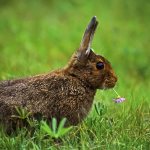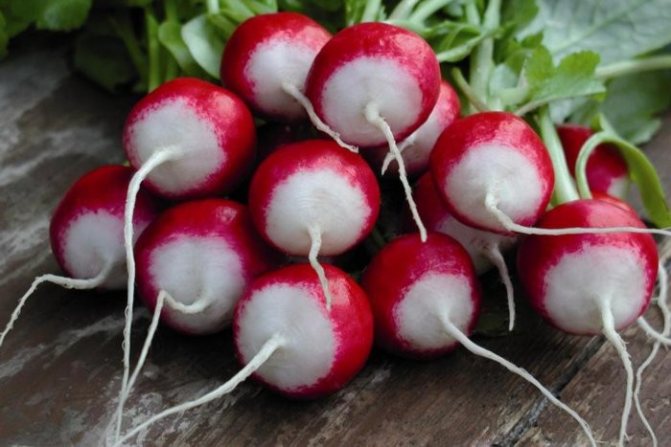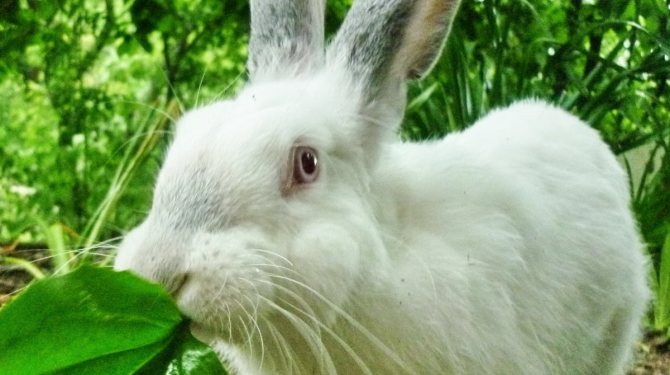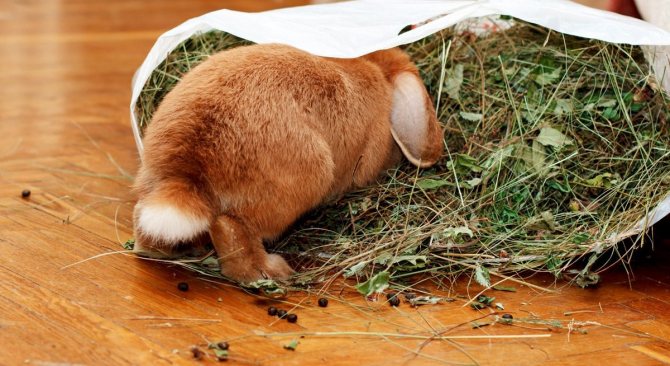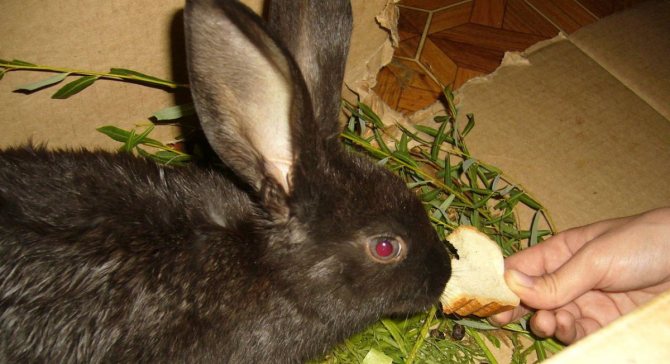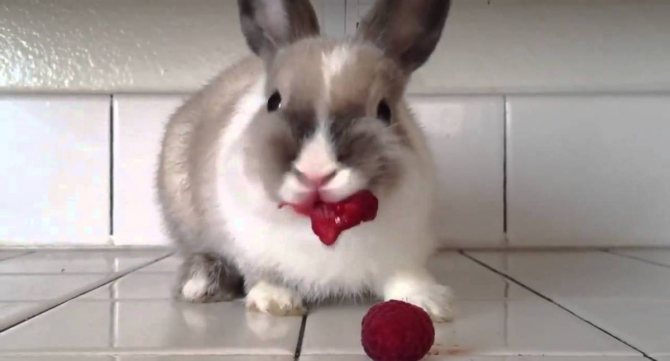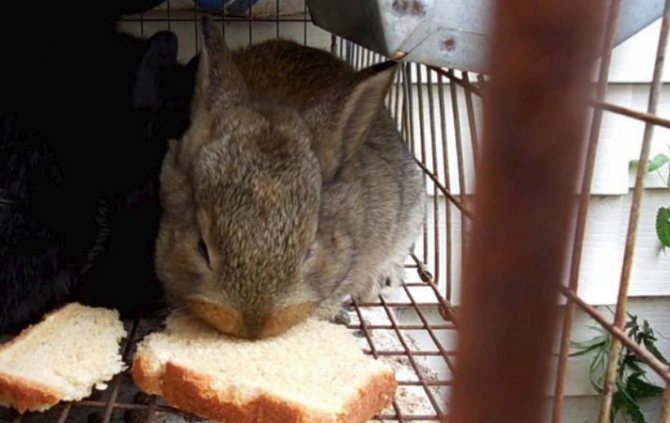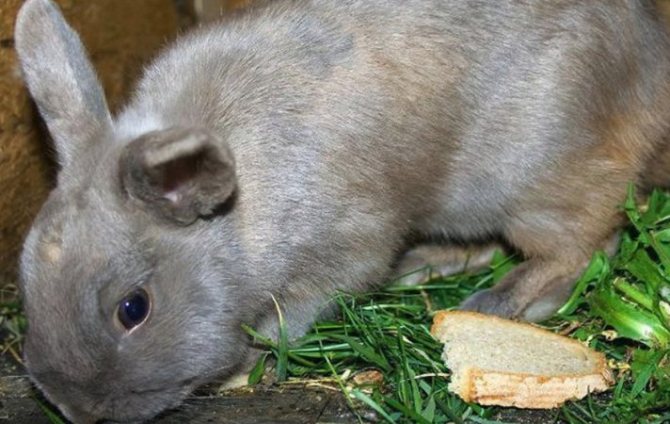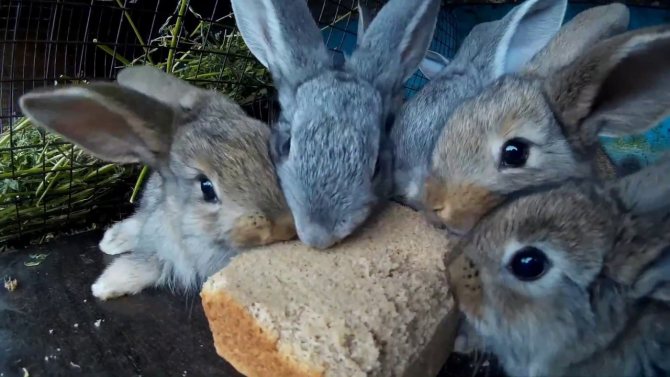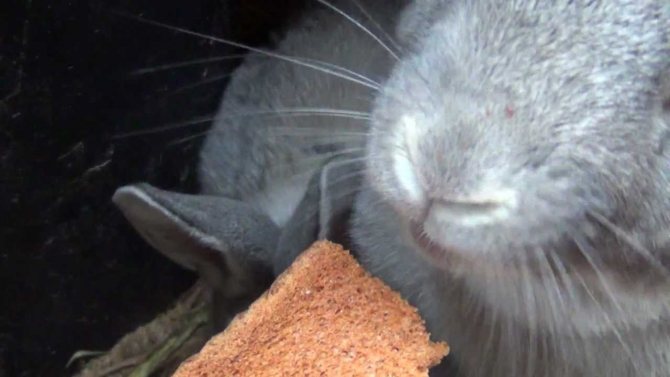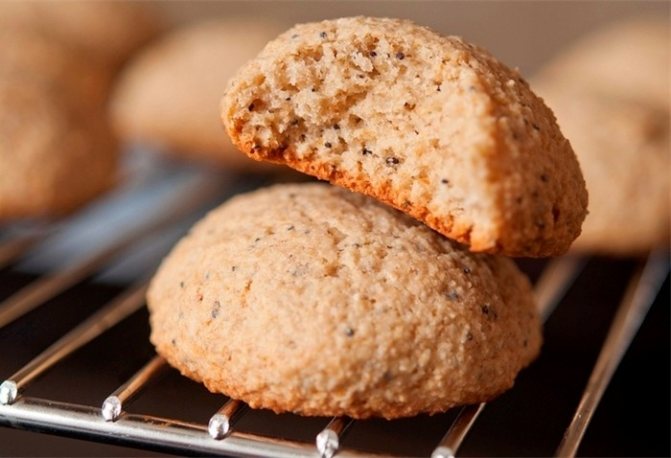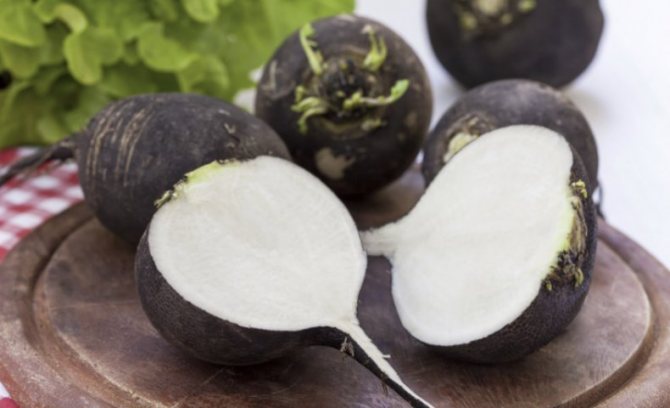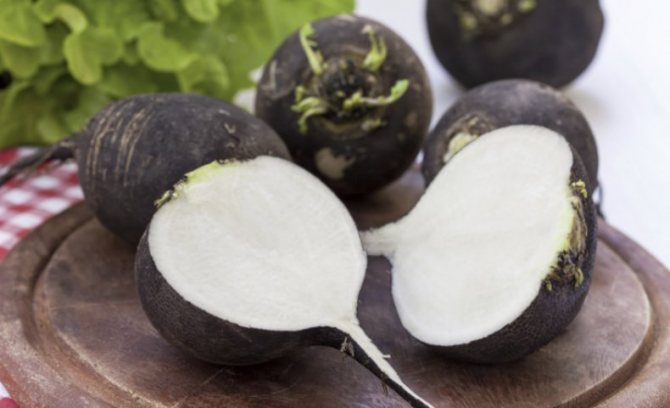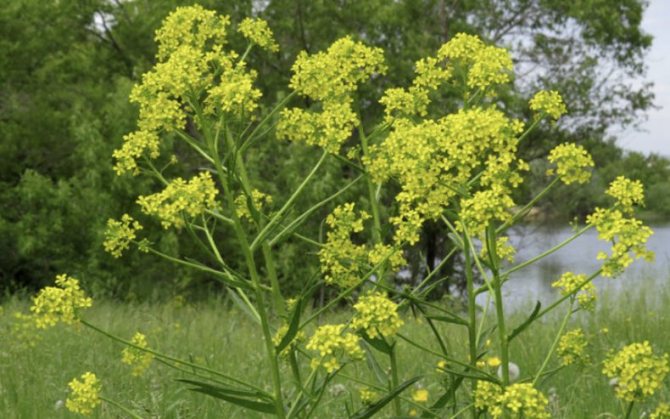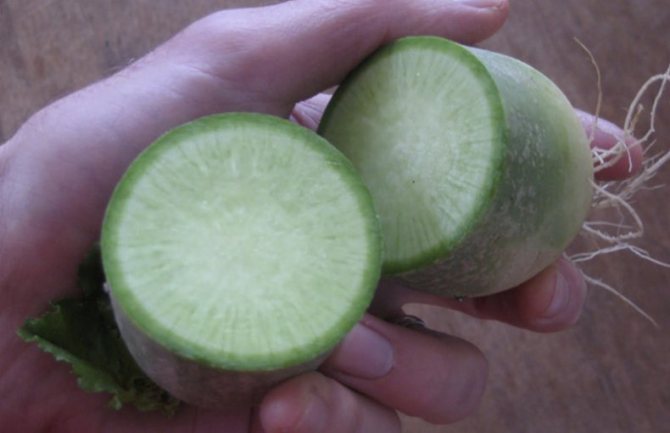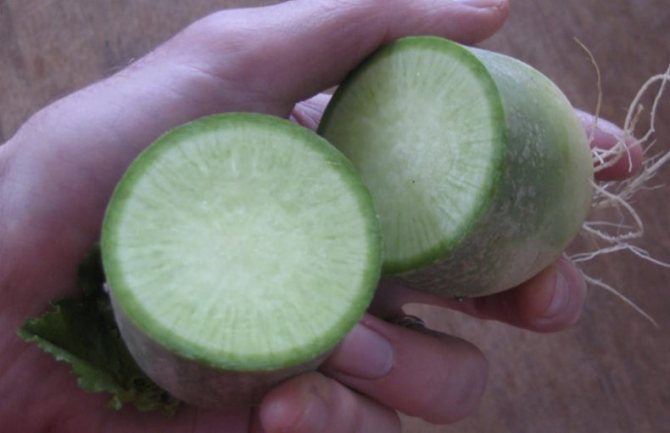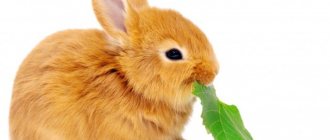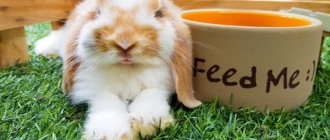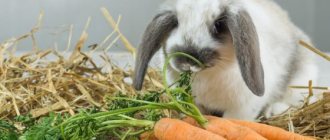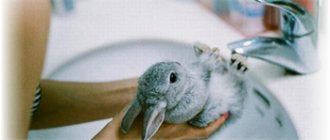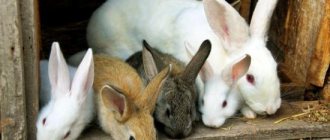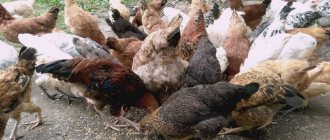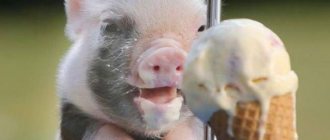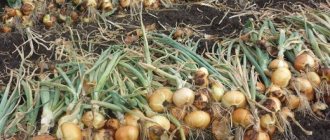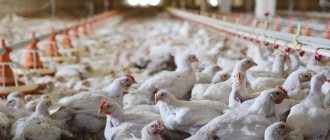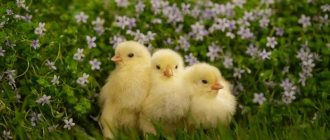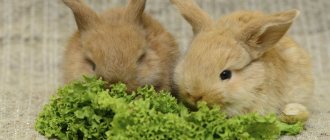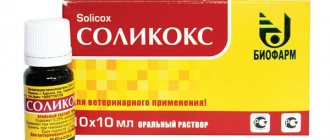Prohibited foods
Rabbits have an extremely sensitive digestive system. Like any herbivore, their body adjusts to a certain diet, produces only enzymes necessary for the digestion of plant food. However, the diet of these fluffy animals should be quite varied. The food of rabbits should contain the basic elements of nutrition (hay and herbs), as well as additional, delicacies (fruits, juicy vegetables).
In general, rabbit food should consist of roughage (such as hay or twigs), herbs (meadow, medicinal, or vegetable), succulent food (fruits, vegetables), and concentrated cereal or bean mixtures. But not all vegetables and herbs can be fed to your pets. About what you can not feed rabbits, and what you can, we will talk further.
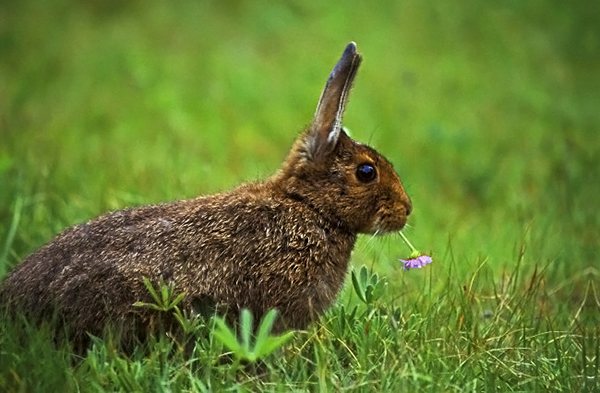
Vegetables
Rabbits treat vegetables with great warmth. Many inexperienced rabbit breeders, noticing the mental predisposition of fluffy ones to vegetables, think that you can give them fruits and tops in any quantity. And this is very dangerous. An excess of juicy food (which includes vegetables and fruits) leads to disruption of the intestines, bloating, and with severe overeating, to the death of pets.
From the video "Poisonous Herbs" you will learn a lot about what pets should not eat.
In addition, dried vegetables are also unacceptable in large quantities. The point is the excess of sugars and the swelling of dry vegetables, which increase in mass, lead to intestinal blockage. Also, rabbits should not be given heat-treated vegetables. Any boiled, baked or fried vegetable crops should not be given to rabbits.
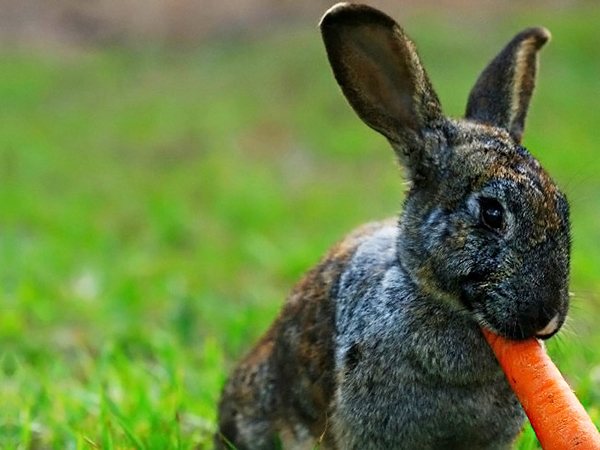

There are a number of vegetables that are prohibited from giving to rabbits. So, they cannot eat:
- young potatoes (both tubers, tops, and any green fruits);
- red cabbage;
- tomatoes (both tops and fruits);
- eggplant;
- fruits of red beet;
- onion.
Fruits
Fruit in the diet of rabbits should also be present. So, pussies in the summer can be given a small amount of dried apples or pears. However, it is worth remembering that the seeds must first be removed from the fruit. In addition, you can prepare such feed yourself at home. Store-bought dried fruits are processed with special mixtures that ensure long-term storage, and they will not benefit rabbits. Also, rabbits should not be given heat-treated fruits.
It is forbidden to include any exotic fruits (pineapples, mangoes, figs, oranges, etc.) in the diet.
Plants
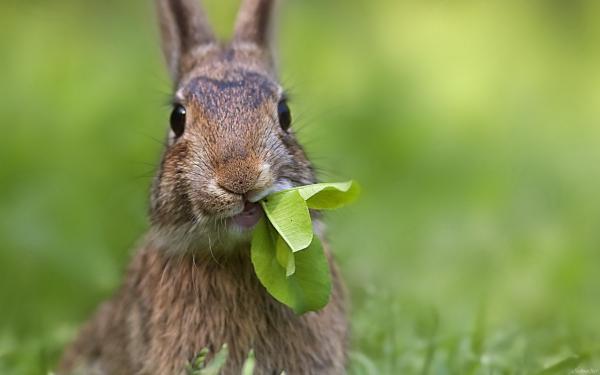

The rabbit diet in summer must include three types of herbs: garden, meadow and medicinal. It is important to remember that herbs should only be dry and sun-dried, harvested at home. It is forbidden to give plants immediately after rain or wet processing. It is also important to ensure that no poisonous plants for rabbits enter the diet. Even a small weed or lily of the valley can send your little ones to the next world.
Milk products
It is worth remembering that rabbits at home in the summer need protein, but protein of plant origin. That is why there is no point in giving these animals milk, cottage cheese or meat as top dressing.In addition, it can be downright dangerous for rabbits, as it can easily lead to serious digestive problems.
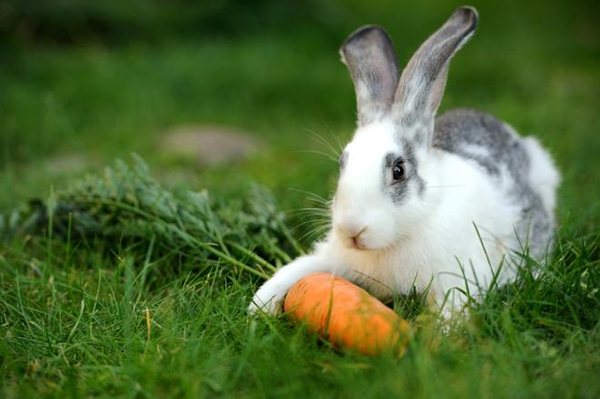

Legumes and grains
Legumes and grains are also a small part of the rabbit's diet. But it is important to remember that rice, millet, rye and millet can be stopped for feeding rabbits. These foods do not provide any benefit, but only increase the amount of mucus in the stomach. Also, young peas and beans should not be given to rabbits in large quantities. These foods lead to severe bloating, colic, and sometimes death of pets.
Any grain mixture is low in fiber or calcium. They can lead to obesity and dental problems. The same can be said about not giving corn or dried peas.
Possible harm to the vegetable
If consumed excessively, the root vegetable can be harmful to rodents, as it contains a lot of essential oils and organic acids. An excess of these substances negatively affects the health of animals.
The quality of the product is very important to rodents. Food should not be dirty or rotten. You can not give the animals vegetables that have been treated with chemicals - this can lead not only to poisoning, but also to death.
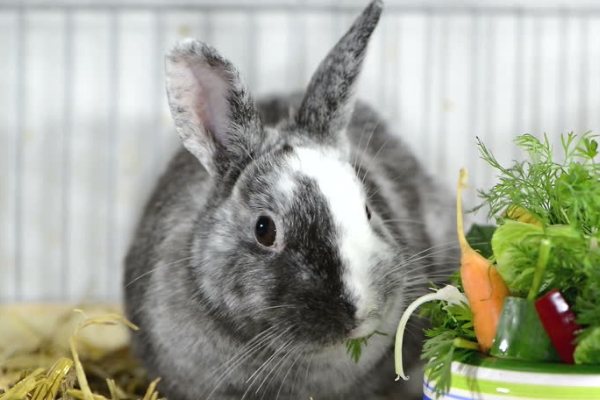

What should you pay attention to?
When compiling a diet for rabbits at home, it is important to consider not only safety, but also the quality of the products. Next, we'll talk about the importance of fresh and specialized food.
Stale food
Please note that any pet food must be fresh, especially in summer. Rotting hay or mold on the branches can not only seriously damage the health of the rabbits, but also simply kill the babies.
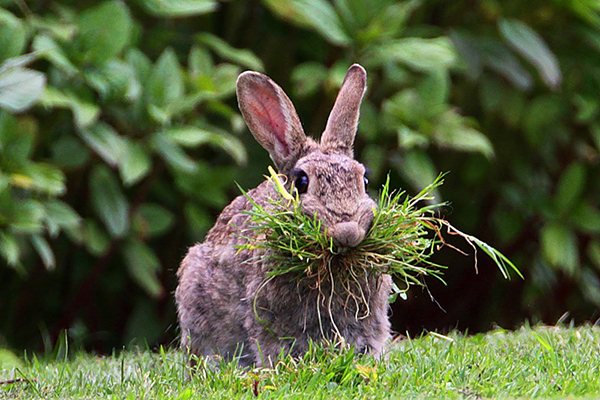

Products from our table
Rabbits are herbivores, they cannot eat our food. Such a diet can not only lead to a deterioration in the growth and life of rabbits, but also have a very negative effect on the quality of meat. The following foods should not be added to the diet of domestic rabbits.
- Chocolate. Any chocolate products: sweets, lollipops, toffee. This product is very dangerous for rabbits as it is very toxic.
- Bread. Baked goods and rusks do not have any nutritional value. In addition, they can lead to sudden weight gain, dental problems and the abandonment of the rest of the basic diet. Baking and biscuits are just as dangerous for rabbits due to obesity and too much sugar.
Feed for other animals
In addition, do not feed rabbits at home with food not intended for these animals. Remember that foods for chinchillas, hamsters, birds and rats are too low in fiber and calcium. In addition, such food can cause obesity or swelling of the internal organs in rabbits and adults. Also, do not give rabbits and store-bought treats. These foods are unaccustomed to the fragile digestive system of rabbits, and can lead to a serious excess of sugars.
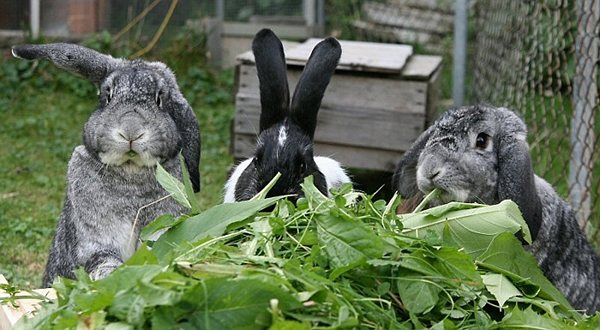

Do rabbits eat bread
Many rabbit breeders believe that baked goods are indispensable for their pets, because due to the nutrients they contain, they improve the taste of meat and the commercial quality of fur.
However, veterinarians say that not all eared breeds will benefit from this kind of food. In particular, the ban applies to all varieties of decorative rabbits. Even small doses of bread can kill dwarf wards.
Important! Any flour products for ornamental rabbits are slow-acting poison. This also applies to sweets, cookies and other sweets. Even a single chocolate product can be fatal for a decorative animal.
For meat breeds, bread is a storehouse of carbohydrates, which should be at least 80% in the diet of this group of animals.
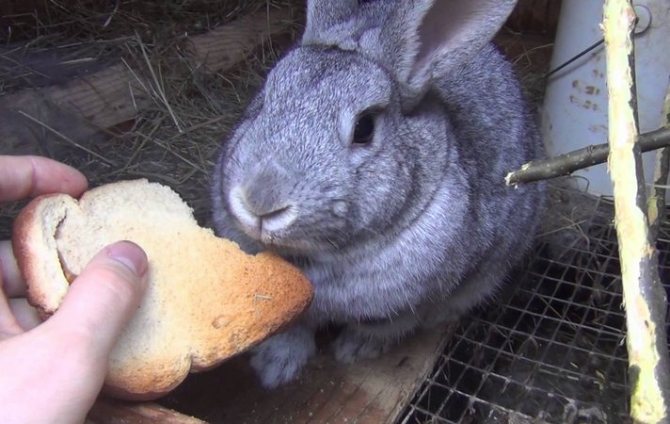

The researchers note that this product is not “empty calories” as it contains:
- valuable proteins;
- fats;
- B vitamins;
- manganese;
- selenium;
- sodium;
- chlorine;
- iron;
- zinc;
- copper.
Together, these components have a beneficial effect on the work of the cardiovascular, immune, nervous systems, organs of the digestive tract, metabolism, coat quality and the development of muscle tissue. It is characteristic that useful acids are preserved even in bread crumbs.
Find out if bread can be added to the diet of laying hens.
However, during the drying process, bread loses a significant amount of vitamins and minerals, so it cannot be the basis of a rabbit's diet. In addition, according to experts, such products are fraught with danger to the health of eared pets.
Video: is it possible to feed rabbits with bread
https://youtu.be/oU1ehZ9D8Ls
Possible ailments:
- incorrect sharpening of the incisors (rabbits do not chew high-calorie food, moreover, there are no silicon dioxide crystals in it);
- weakening of the jaw tissues, which develops against the background of hypovitaminosis;
- the occurrence of dental malocclusion (incorrect position of the teeth), which prevents the full operation of the jaw apparatus;
- digestive disorders (disruptions occur due to the fact that the animal's gastrointestinal tract is configured to assimilate mostly untreated plant feed);
- the risk of enteritis (inflammatory processes in the organs of the digestive tract occur due to disturbed microflora);
- obesity (the inactivity of the rabbit is fraught with skin and infectious diseases).
Did you know? Rabbits chew 120 times a minute and have over 17,000 taste buds.
Useful Tips
With a balanced diet, rabbits do not need to use any additional beneficial micronutrients. Therefore, they may not be given salt or salt blocks. The fact is that an excess of this product in the body is just as dangerous. In addition, rabbits can gnaw a block only for the sake of getting rid of boredom when caged.
In addition to feeding with wet grasses, rabbits should also not be given lawn grass or plants that were collected near the track or on contaminated areas of the street.
Healthy live weight gain and fruiting in rabbits are directly related to nutrition. So, each rabbit should eat at least 400-hundred kilograms of grass and 100 kilograms of hay in the summer. It is also worth remembering that hay should be present in the diet of rabbits all year round. It is a round food for grinding down growing teeth.
Using millet
Many novice breeders are interested in whether millet can be fed to domestic rabbits. Rabbit breeders rarely use millet in feeding their animals. It is believed that strong rabbit teeth are designed for larger grains, and it is quite possible to choke on such "bird food".
However, experienced farmers sometimes use it, especially in winter when the seeds begin to sprout. Ordinary grains should initially be processed:
- grind in a grinder;
- steam or brew.
Further, such a mass is fed to animals, adding to the mash. Another good way is to grind the grains and sprinkle them on the grated root vegetables.
In general, if you have a lot of millet, but there is nowhere to go, you can fully use it. Well, the sprouted grains are eaten by rabbits for a sweet soul.
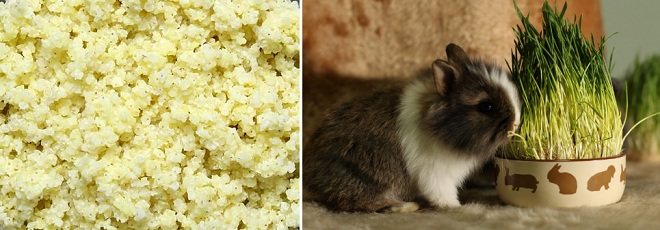

It is better to give millet to sprouted rabbits, but it is permissible and pre-cooked
Photo gallery
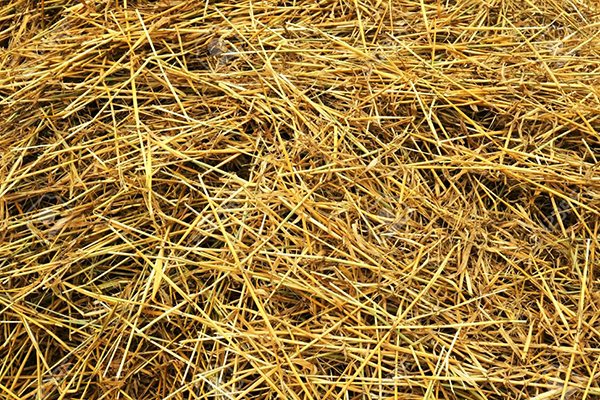

Photo 1. Hay, important in the diet of rabbits
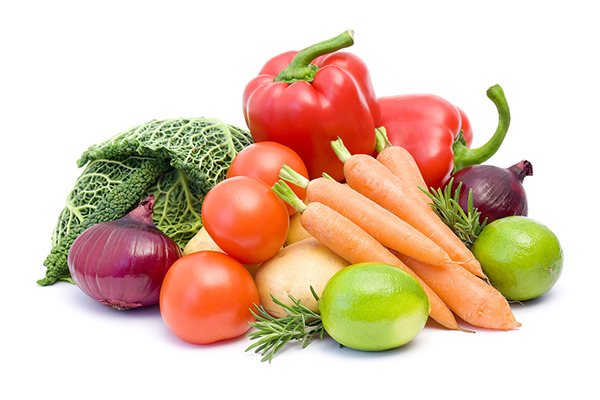

Photo 2. Various vegetables from the food of rabbits
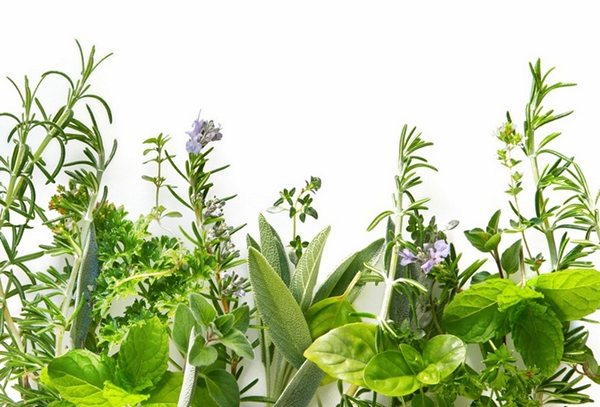

Photo 3. Mixtures of herbs needed by rabbits
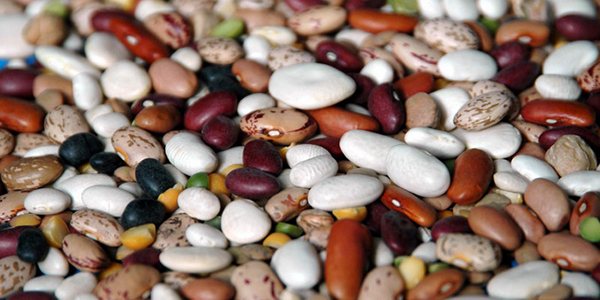

Photo 4. Several legumes
Feeding diet
If the diet is correctly formulated, the animals begin to rapidly increase their live weight. At the same time, they accumulate fat and become very well-fed. The faster the rabbits gain weight suitable for slaughter, the more tender and tasty their meat will be. The coat of young individuals is also of better quality.
Proper feeding assumes the following.
- You need to start fattening six weeks before the intended slaughter.
- It is better to keep no more than six individuals in one cage.
- In one group, animals of approximately equal size are selected so that the larger ones do not push the smaller ones away from the feeders.
- Feeding is stopped when the animals become inactive and lose interest in food.
The nutritional diet is as follows:
- concentrated feed should be about half of the total volume;
- add cereals and feed that increase the percentage of fat. These are corn and barley, peas and oats, boiled potatoes;
- parsley, dill and celery are mixed with dry hay. These foods also contribute to weight gain.
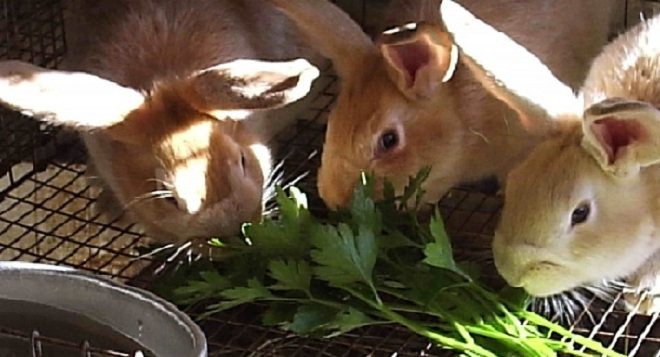

Parsley promotes weight gain
Germination
Millet is usually not given to rabbits in its natural form. The grains can be ground and sprinkled on other foods, such as root vegetables. Also millet seed is brewed or steamed. This gruel can be added to the mash.
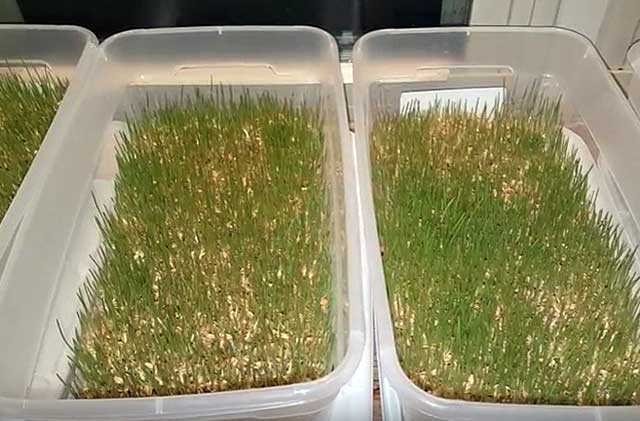

Sprouted grain is given to rabbits without additional processing. Barley and corn must be crushed and steamed for better assimilation. But wheat grains and oats can be fed without additional processing, since they are quite soft.
If any of these crops are germinated, then for rabbits it will be another source of vitamins. When there are few rabbits, germination cereals are placed in a wet cloth. Humidity must be maintained until sprouts appear.
On a large farm, the grains are laid out in large containers, filled with water and left for 12 hours. When the contents swell, it is transferred to cellophane bags for germination (8 cm layer) with holes for draining the water. Sometimes you need to shake up the grain. Such food is introduced gradually, in large quantities, it causes bloating. If the grain has darkened during the sprouting, then it is not suitable for feeding rabbits.
Steaming and yeast
It is much easier for rabbits to eat steamed food. You need to take one type of cereal or a mixture and pour it into a bucket so that about 10 cm remains to the edge. After that, pour boiling water and add 1 tbsp. a spoonful of salt. The mixture must be mixed, and the container must be covered with a lid. The mass is infused for 5 hours.
Yeast feed is used for raising rabbits for meat from the age of four months, when it is necessary to ensure rapid weight gain. To do this, take part of the grain and two parts of water (36 g of yeast is needed for 2 liters). The whole mixture is left overnight, but you need to stir occasionally. Full fermentation takes 6 to 9 hours.
In the morning, you can serve a mixture with dry cereals, 2-3 tablespoons each. The rabbit eats such food for 5 days. After they pass, the yeast feed must be replaced with any other.
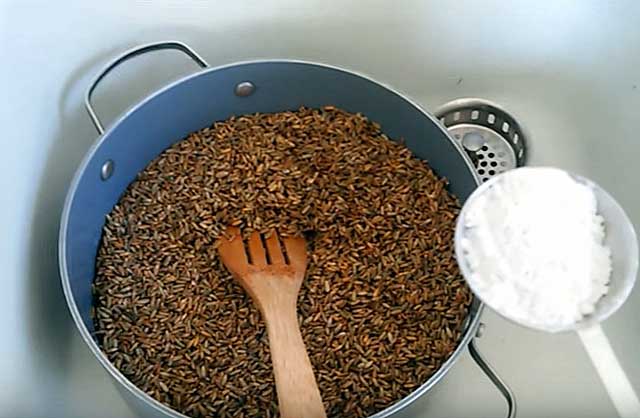

In any case, it is best for rabbits when alternating and mixing grains to avoid excess weight gain or bloating. A strong increase in body weight and internal fat occurs from feeding with barley alone. There must be fresh water in the drinking bowls.
Diet for young animals
After the babies are taken away from their mother, they are transplanted into a separate cage. Now they need to arrange for proper care. For feeding the rabbits, you can start up the food that they already ate, living in the same cage with their mother.
The first few days it is better to feed them:
- boiled potatoes;
- grated carrot;
- hay.
It is constantly necessary to monitor whether the young stock has enough feed and, if necessary, gradually add it. Those individuals that are weaker can be repelled by stronger relatives from the feeder. Such a bunny should be immediately transplanted into a separate cage, and let him eat there separately.
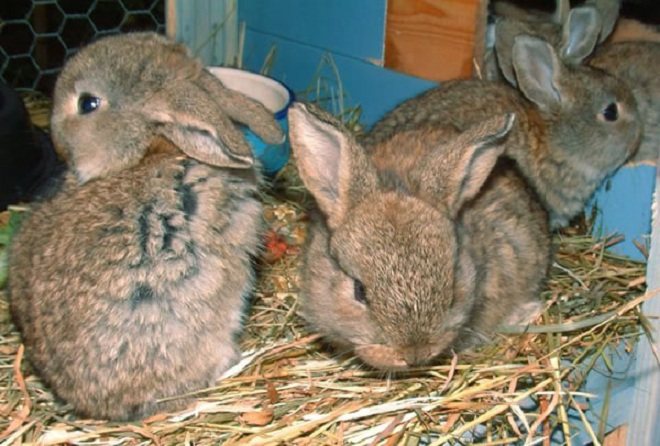

After weaning from breast milk, hay, carrots and potatoes should be included in the diet of young animals.
What herbs should not be fed to rabbits?
Summer is a pair of juicy greenery.Inexperienced breeders pick up a lot of grass for their rabbits, regardless of the type of plant. But in the meadows there is a lot of grass, not only useful, but also poisonous for rabbits. What can you not feed rabbits with greenery?
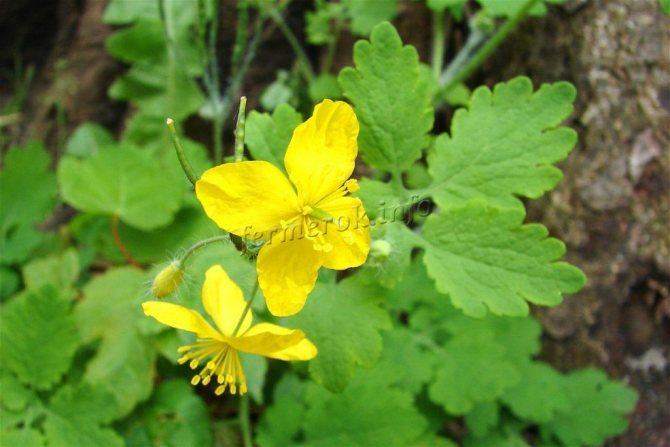

Celandine - rabbit poison
The most poisonous plants for rabbits are: wild radish, dope, aconite, celandine, poisonous milestones, cornflower, euphorbia, marsh horsetail, hemlock. Some of these herbs are considered medicinal for humans, but for a fluffy animal, they can be deadly. In addition, rabbits should not eat poppy, sleep-grass, buttercup. Such greens are poisonous for any rabbit, but if you can still try to save an adult pet, then the kids will die from it in a matter of hours.
It is worth noting that even a healthy herb should be given only dried or dry, and not fresh! Fresh grass may cause bloating in the rabbit.
Food waste
From food waste, the diet includes banana peels, dried bread crusts or crackers, peeled potatoes and kaputa, leftover vegetables, pumpkin and watermelon peels, noodles and pasta.
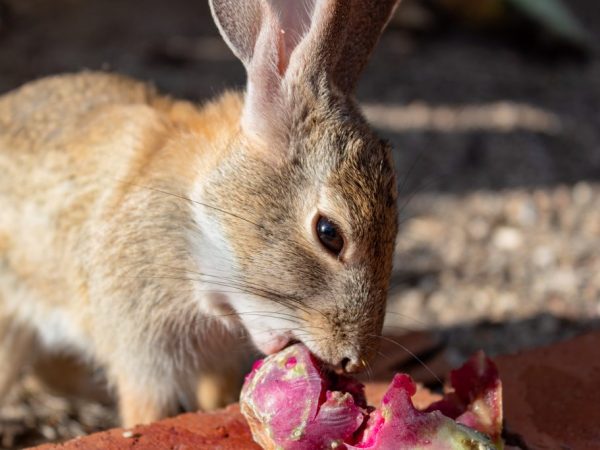

Waste makes up an essential part of the rabbit menu. In the composition of wet mash, they are given the remnants of porridge, potatoes, pasta, they make wet mash on not very fatty soups
Low-fat soups are used to make various mash.
Allowable amount of food waste in the daily ration of the rabbit is 200 g.
Also in the diet include acorns and chestnuts, waste of viticulture and grain crops. Pre-acorns are peeled. You can grind them, or you can give them whole.
Separately, it is worth making a reservation about cereals. Hercules and buckwheat are useful for rabbits. The groats can be pre-steamed, or they can be poured into the feeders raw.
The oatmeal is steamed for 3-4 minutes. With a longer heat treatment, they lose most of the nutrients. Barley porridge will do instead.
Polished rice in any form is contraindicated, and unpolished analog is allowed in limited quantities. The groats must be heat treated. Rice is astringent and can be used as a remedy for diarrhea. Millet, sorghum and millet are harmful to rabbits.
Food waste that has already begun to deteriorate or become moldy should not be fed to rabbits.

